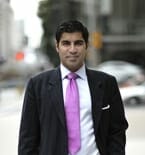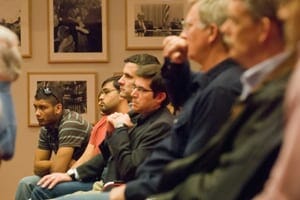By Program

How to Run the World: Charting a Course to the Next Renaissance
February 7, 2011 | 5:00:00 | LBJ Library Atrium, 10th Floor

The Robert S. Strauss Center for International Security and Law welcomed Dr. Parag Khanna, Senior Research Fellow at the New America Foundation, on February 7, 2011. Dr. Francis J. Gavin, Director of the Strauss Center, introduced Dr. Khanna.
Dr. Khanna discussed his new book, How to Run the World, which provides a bold account of the current global chaos and a roadmap for creating a stable and self-correcting world for future generations. Dr. Khanna began the discussion by noting that, despite the subject matter breadth indicated by its title, his book actually focuses specifically on the value of diplomacy in the modern world. The existing international system of diplomacy is in need of reform, he said, to address a host of global challenges. He contends that neither international institutions nor any individual state has acknowledged the need for this reform and acted accordingly.

Dr. Khanna argues that states need to harness the full power of a variety of actors including nongovernmental organizations, multinational corporations, sub-national governing bodies and even individuals to succeed in the emergent international system. While bilateral and multilateral agreements among states are still an important component of diplomacy, public-private partnerships are increasingly forceful actors on the world stage and have had measured success in addressing such issues as the blood diamond trade. Private-private partnerships are also integral to diplomacy, often proving as strong as multilateral coalitions in addressing global concerns such as environmental degradation and public health issues.
Conventional wisdom, Dr. Khanna said, places too much emphasis on centralization of global governance regimes, or the expansion of existing multilateral regimes such as the United Nations Security Council. Decentralization, or the ability to “think globally, act locally,”¬ù offers a more effective means of addressing global challenges by optimizing the use of both state and non-state actors.
Dr. Khanna advocated the use of “mega-diplomacy,”¬ù or diplomacy that harnesses both public and private resources and encompasses all level of actors with an interest in a given topic, to address any manner of global challenges. He concluded the presentation by imploring younger generations to get involved in the emergent multi-faceted diplomatic process.

Following the lecture, Dr. Khanna fielded questions from the audience on a host of topics, including the role of technology and religion in mega-diplomacy, priorities of state and non-state organizations in the international system, global population trends and the scope of governments’ role in mega-diplomacy.
Parag Khanna is a Senior Research Fellow in the American Strategy Program at the New America Foundation. He is author of the international bestseller The Second World: Empires and Influence in the New Global Order (2008) and How to Run the World: Charting a Course to the Next Renaissance (2011). In 2008, he was named one of Esquire’s “75 Most Influential People of the 21st Century,”¬ù and one of fifteen individuals featured in WIRED magazine’s “Smart List.”¬ù He holds a PhD from the London School of Economics, and Bachelors and Masters degrees from the School of Foreign Service at Georgetown University.
Watch the full presentation below:


